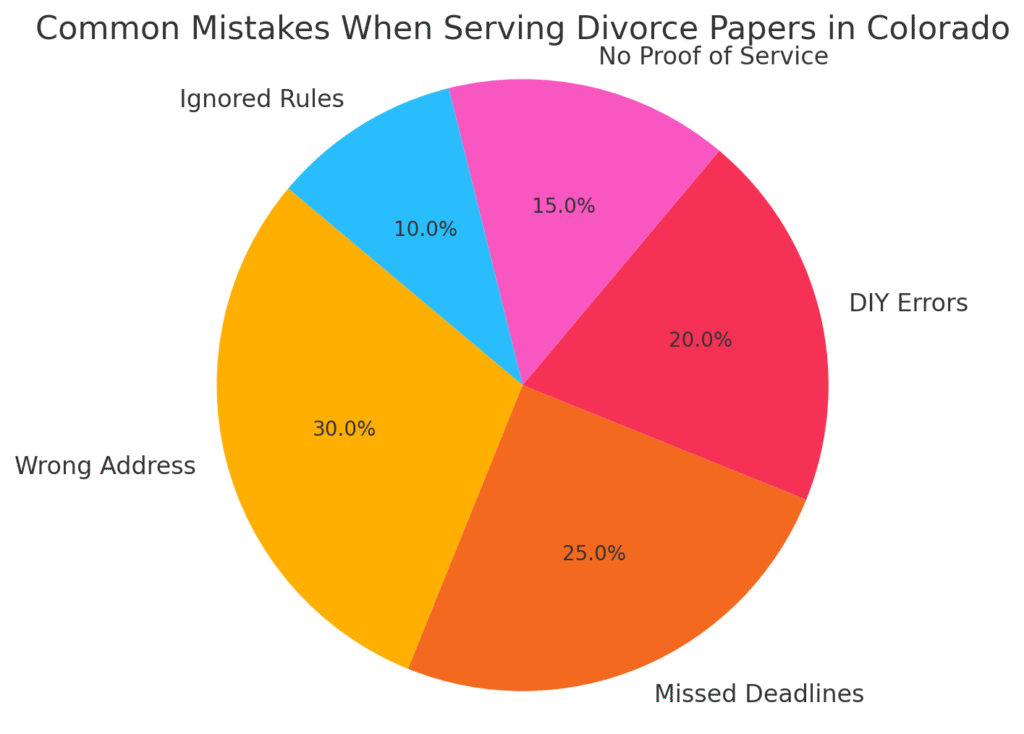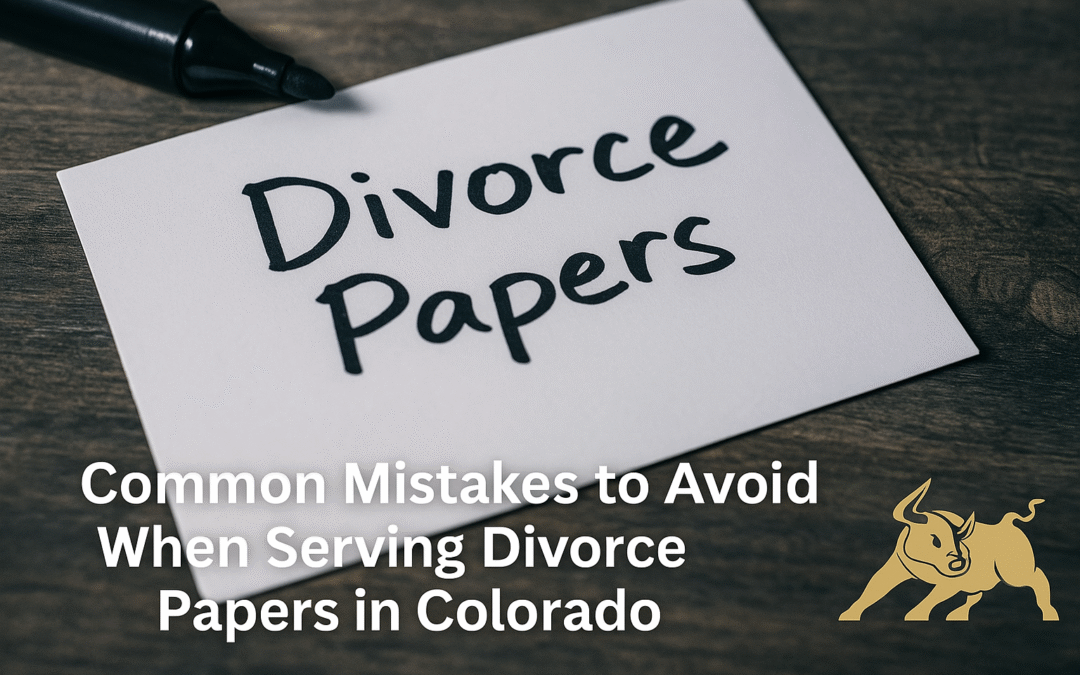Serving divorce papers is a critical step in the dissolution process — one misstep can delay your case, create extra costs, or even jeopardize your ability to move forward. In Colorado, where specific rules govern how and when legal documents must be delivered, knowing what not to do is just as important as knowing what to do. In this comprehensive guide, we’ll walk through the top mistakes people make when serving divorce papers in Colorado, explain why they matter, and share smart, actionable tips to help you steer clear of costly errors.
Understanding the Divorce Paper Service Process in Colorado
Before diving into common pitfalls, let’s quickly review how divorce papers should be served in Colorado. Under Colorado Rule of Civil Procedure 4, you must formally deliver a summons and complaint to your spouse—or their attorney—within 63 days of filing. Accepted methods include:
- Personal service by a professional process server or sheriff
- Leaving the papers at the spouse’s dwelling when someone of suitable age accepts them
- Court-authorized alternative service (publication, posting)
- Certified mail with return receipt (in very limited circumstances)
Understanding these methods is the first step to avoiding mishaps. If you’re searching “Colorado divorce process serving rules,” bookmark our Process Service page for a breakdown of all your options.
Mistake #1: Using the Wrong Address or Incomplete Information
Why Address Accuracy Matters
A missing apartment number, outdated street name, or typo in your spouse’s last known address can cost you a service attempt. Colorado courts require “due diligence,” meaning multiple attempts at different locations may be necessary if the initial address is bad. That translates into weeks of delay and added fees.
Tips to Verify the Correct Address
- Check recent utility bills, tax records, or official correspondence for current addresses.
- Use skip-tracing services to uncover hidden forwarding addresses — especially for relocated spouses.
- Confirm mailing and physical addresses separately. Some people list PO boxes for mail but live elsewhere.
When in doubt, partnering with a professional skip tracer ensures you’re not chasing ghosts. Learn more about our Investigation Services.
Mistake #2: Ignoring Colorado’s Service Rules and Deadlines
Skip the 63-Day Deadline at Your Peril
Colorado law gives you just 63 days to serve after filing your complaint. Miss that window and the court may dismiss your case — meaning you’ll have to start over with new filing fees and possibly different timelines.
Using Improper Service Methods
Not all jurisdictions accept service by certified mail or email. Some rural counties enforce personal, in-person service only. Attempting a method not recognized in your county could render your service invalid. Before acting on “DIY divorce serving tips,” check local court rules or consult resources like HelloDivorce’s guide.
Mistake #3: Attempting DIY Service Without Professional Guidance
The Risks of Self-Serving
You’re allowed to hand papers to your spouse yourself if ordered by the court. But in high-conflict divorces, your spouse may refuse to accept delivery or claim they never saw the documents. That opens the door to affidavits of attempted service, hearings, and delays.
Why Hiring a Process Server Pays Off
- Neutral third party: Eliminates arguments about “I never got it.”
- Compliance expertise: They know Colorado rules like the back of their hand.
- Proof of Service: Courts accept professionally signed affidavits without question.
For dependable, hassle-free service, check out NOBULL’s Process Service offerings across Southern Colorado.
Mistake #4: Failing to Secure Proper Proof of Service
The Importance of the Affidavit or Certificate of Service
After service, Colorado courts expect an affidavit (sometimes called a certificate of service) stamped and signed by the server. This document details who was served, where, when, and how. Without it, your case file remains incomplete.
Common Proof-Related Slip-Ups
- Missing dates or incorrect time entries
- Unsigned or unstamped affidavits
- Affidavits filed in the wrong county
Our team ensures every affidavit is court-ready. Learn how we handle service proof so you can focus on the legal strategy, not paperwork logistics.
Mistake #5: Overlooking Special Circumstances (E-Service, Substituted Service)
When E-Service Is Available
Colorado courts now permit electronic service of family law documents if both parties consent. But skipping the written consent form or emailing the wrong PDF can invalidate your E-Service attempt. Always file a “Notice of Consent to Electronic Service” beforehand.
Using Substituted Service Properly
If personal service fails after two attempts, you can ask the court for substituted service—like leaving documents with a responsible adult at the workplace or posting notices. Attempting substituted service without a court order is a recipe for rejection.

Avoid these common pitfalls—choose NOBULL Process Service for fast, accurate, and hassle-free document serving!
Best Practices for Serving Divorce Papers in Colorado
- Plan Ahead: Map out multiple addresses and service attempts in advance.
- Document Everything: Keep photos, notes, and logs of every attempt.
- Verify Identity: Always confirm the recipient’s identity before handing over papers.
- Stay Within the Rules: Follow Colorado’s deadlines and permitted methods to the letter.
- Get Professional Help: Partner with licensed process servers like NOBULL Process Service to eliminate guesswork.
When to Hire a Professional Process Server in Southern Colorado
If you’re dealing with evasive respondents, multiple residences, or simply want rock-solid proof of service, a professional process server is your best bet. Here’s when to pick up the phone:
- High-conflict divorces where personal delivery could provoke disputes
- Remote or rural service locations that require local knowledge
- Complex service types like substituted or E-service
- Competitive timelines where every extra day counts
NOBULL Process Service has served thousands of divorce papers across Southern Colorado since 2010. See our coverage area and service options on our Services page.
Additional Resources for Colorado Divorce Service
- How to Serve Divorce Papers — HelloDivorce’s step-by-step guide
- Guide to Divorce Papers in Colorado — Denver Family Law Matters blog
- How Legal Papers Are Delivered — Colorado Legal Aid overview
Final Thoughts & Next Steps
Serving divorce papers in Colorado doesn’t have to be a headache. By avoiding these common mistakes—like using the wrong address, missing deadlines, or skipping professional help—you’ll keep your case on track and reduce stress. Ready to get started? Reach out to NOBULL Process Service at (719) 406-0510 or nobullprocess@gmail.com for a free quote. Our licensed team is on call 24/7 to ensure your documents are served quickly, accurately, and hassle-free.
Frequently Asked Questions About Serving Divorce Papers in Colorado
1. What methods are legally accepted for serving divorce papers in Colorado?
Colorado courts allow personal service (hand-to-hand delivery), substituted service (leaving with a responsible adult), and court-authorized alternatives (posting or publication). Some counties even permit electronic service if both parties consent. Always check your local district’s rules before choosing a method.
2. How long do I have to serve divorce papers after filing?
You must complete service within 63 days of filing your complaint. Missing that deadline can lead to case dismissal, so plan ahead and monitor your filing date closely.
3. Can I serve divorce papers myself, or do I need a professional process server?
You can self-serve only if the court specifically authorizes it, but it’s risky—your spouse may refuse to acknowledge receipt or dispute the validity. Hiring a licensed process server like NOBULL Process Service ensures neutral delivery and a court-acceptable affidavit of service.
4. What happens if my spouse can’t be found at their last known address?
After two failed personal attempts, you can request substituted service or alternative service (publication or posting) from the court. Document every attempt and secure a court order before using these backup methods.
5. How do I provide proof that divorce papers were served?
Your process server files an Affidavit (or Certificate) of Service detailing who was served, when, where, and how. That document, signed, notarized, and stamped, is filed with the court to demonstrate compliance with service rules.
6. Is electronic service of divorce papers allowed in Colorado?
E-service is available in family law cases only when both parties file a “Notice of Consent to Electronic Service.” Without that notice, email alone won’t count—stick to in-person or substituted methods unless you’ve filed consent.
7. What factors can delay or invalidate service of divorce papers?
Common pitfalls include using an incorrect or outdated address, missing the 63-day window, improper service methods, and failing to file proper proof. Each error can stall your case or force you to re-serve documents.
8. Can I serve papers on weekends or after business hours?
Yes—Colorado doesn’t restrict service to business days. A professional process server can meet your spouse evenings or weekends to ensure timely delivery, especially when deadlines are tight.
9. How much does professional process serving cost in Colorado?
While rates vary, factors like urgency (same-day vs. standard), number of attempts, and distance influence pricing. NOBULL Process Service offers some of the most competitive flat-rate fees in Southern Colorado with no hidden charges.
10. What should I do if my spouse claims they never received the papers?
If your affidavit of service is properly completed—showing date, time, address, and recipient’s name—courts generally accept it as conclusive proof. If disputes arise, request a hearing and present your server’s affidavit alongside any photographic or GPS evidence of delivery.

